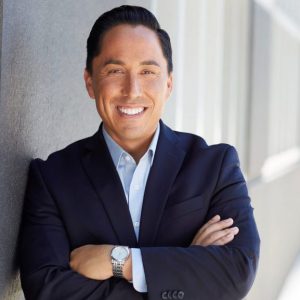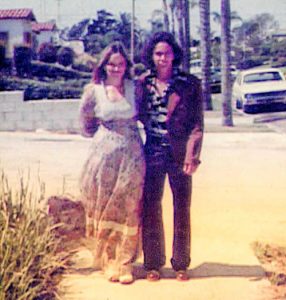Gloria and Bry: Two Different Paths to City Hall

The two candidates competing to be the next mayor of San Diego come from distinctly different backgrounds and from different generations but from the same political party in what is San Diego’s first Democrat-only mayor’s election.
San Diego Councilwoman Barbara Bry and State Assemblyman Todd Gloria will face off in the November 3rd election after eliminating San Diego Councilman Scott Sherman, a registered Republican, in the primary in March. The two elected officials have both served on the Council; Bry currently represents the coastal areas in District 1, and Gloria represented Central San Diego’s District 3 from 2008 to 2016 before being elected to the Assembly.
Barbara Bry:

Bry (pronounced BREE) was elected to represent District 1 in 2016 after then-Councilwoman Sherri Lightner was termed out of office. It was Bry’s first election for public office after a successful career in business, news media, and community involvement.
Originally from Philadelphia, Bry, 70, moved to San Diego in 1981 after working for the Sacramento Bee newspaper in the state capital and the LA Times in Los Angeles. Bry had moved to Sacramento after receiving her Masters in Business Administration from Harvard University.
Before attending Harvard, Bry had earned a Bachelor’s degree in Sociology and a Masters in Education from the University of Pennsylvania (UPenn), the Ivy League school founded in Philadelphia by Benjamin Franklin in 1740. Bry had worked to pay her own tuition while earning her Master’s at UPenn.

Bry’s parents were married in Mexico City in 1943 while her dad, an Army Air Corps officer, was stationed in Panama during World War II. Her mom worked at an aircraft factory during the war and later became an editor of an aircraft magazine.
After the war ended, her dad, a graduate of the Massachusetts Institute of Technology (MIT), worked as an engineer in the textile industry.
Bry’s parents divorced when she was young, and her single mom later became the first female account executive in a Philadelphia ad agency. Her mom earned less than her male co-workers, and even had to find a male friend to co-sign so she could qualify for a home loan, leaving a lasting impression on Bry that woman faced obstacles to equality in the workplace.
Bry’s mom returned to school and earned a Masters Degree in Counseling and became a psychologist and an author. Unfortunately, she died of pancreatic cancer when she was only 62 years old.
After her work for the Sacramento Bee, Barbara became a business reporter for the LA Times in Los Angeles then in San Diego. In 1980 she married local developer Pat Kruer. They had two daughters together but divorced in 1993. Bry then worked as the associate director of CONNECT, the San Diego-based startup accelerator organized to help transform the area’s growing research capabilities into an economic driver to increase the prosperity of the region.
Bry met Neil Senturia and together they launched a technology company that was an early Internet-accessible kiosk. That company was later sold to CISCO. They also helped launch ProFlowers.com, an online flower vendor which later became part of FTD. And Bry also served as the first Publisher of the Voice of San Diego, the online non-profit news outlet that covers political and business news in our region.
Bry and Senturia married in 2000 and now live in La Jolla. Together their blended family includes four children and three grandchildren.
As a community volunteer, Bry helped launch Athena San Diego, an organization that supports the advancement of women in the tech and life science sector, as well as Run Women Run, a group that inspires, recruits, and trains qualified, pro-choice women to seek elected and appointed office.
During her term on the City Council, Bry has championed the redevelopment of the SDCCU Stadium in Mission Valley into the new San Diego State University West project. In June, Bry seconded the motion to finalize the City’s sale of the site to SDSU and move forward with the new plan that will include a new stadium, 86 acres of parks, recreation, and open space; over 1.5 million sq ft of office and research space; 4,600 residential housing units with 10 percent set aside for low-income families; a 400-room hotel; and nearly 100,000 sq ft of campus retail. Construction to demolish the former Jack Murphy Stadium began last week.
Recently, Bry has been critical of the City’s purchase of the former Sempra headquarters building at 101 West Ash Street in downtown. The City executed a long-term lease-to-own agreement in 2016 for the building to serve as a new City Hall, agreeing to pay a monthly lease payment of $535,000 for 20 years, totaling more than $127 million, but the deal has now become controversial.
Since the deal was struck, the City has discovered asbestos and other repairs that could cost $115 million to fix, and that city staff did not conduct proper due diligence on the building before agreeing to the deal. Bry has criticized Gloria, who was then a councilman, for making the motion to approve the deal at a council meeting in October 2016 where he said that “for those of us that have been in it, it’s extremely well maintained…I see this as win all the way around…it’s something I want to be a part of today so I’m happy to make that motion.”
Bry has been criticized for advocating in her first two years in office for a “housing first” approach to homelessness which focused on providing shelter as the priority to get people off the streets, but she has refined her approach since last year to instead focus on treating mental health and substance abuse – two leading causes of homelessness – as the best way to combat chronic homelessness.
In the most recent campaign financial disclosures, Bry’s mayoral committee reported raising $1,648,348.98 for her mayoral campaign since the beginning of 2019. Bry is endorsed by homeless advocate Father Joe Carroll, Congressman Mike Levin, former Councilwoman Donna Frye, former Congresswoman Lynn Schenk, and Cesar Chavez’s son-in-law Richard Ybarra, among other local supporters and groups.
Todd Gloria:
Gloria, 42, is currently serving his second term in the California State Assembly having first been elected in 2016 and re-elected in 2018. He has served as the Majority Whip in the Assembly, responsible for tracking support for bills and encouraging legislators to vote for or against bills on the floor.
He previously served on the City Council representing the areas of Hillcrest, North Park, Kensington, and midcity from 2008 to 2016, where he served as President of the Council and, after then-Mayor Bob Filner resigned in August 2013, Gloria served as Interim Mayor for eight months until the special election that saw Kevin Faulconer elected as the new mayor.
During his time as Interim Mayor, Gloria ordered the San Diego Police Department and code enforcement officers to take action against medical marijuana shops which Filner had ordered city staff to stop enforcing; he rehired lobbying firms in Sacramento and Washington that Filner had terminated; he ordered that public records be more available to the public after Filner had made the process more difficult. Although they both Democrats, Gloria reversed several of Filner’s actions.
Before being elected himself, Gloria served as Congresswoman Susan Davis’ district director in San Diego, served on the San Diego Housing Commission, and as Chairman of the Board of the San Diego LGBT Community Center in Hillcrest.

Gloria has been a supporter of short-term rentals during both his time on the Council and in the Assembly. While serving on the Council, Gloria opposed attempts to restrict short-term rentals in San Diego, and last year, he voted against a bill authored by San Diego Assemblywoman Tasha Boerner Horvath that would have banned rentals of less than 30 days, as well as restricted renting out one’s second home on home-sharing platforms like Airbnb.
His support of short-term rentals has been tied to his goal of increasing affordable housing options for San Diegans. Gloria authored AB3243 in 2018 that created a statewide opt-in program for local governments to increase housing along transit corridors. The bill was passed by the Legislature and signed into law by then-Governor Jerry Brown.
Gloria has also been an advocate for electric rental scooters that have sprung up in cities across the country in recent years. Gloria opposed banning the of the scooters by the City, and in 2018 he co-wrote a state law to exempt adults from having to wear helmets on scooters and also authorized cities to allow scooters on more of their local streets.
But Gloria’s approach to affordable housing has also been criticized by homeless-prevention advocates. Gloria famously pledged in 2012 that his City Council re-election agenda included “ending homelessness Downtown in the next four years” but last year was forced to admit that recent homeless counts “do not show the large reductions in the number of homeless in our city that San Diegans want to see.”
As a San Diego native, Gloria grew up in the Clairemont area of San Diego with his parents, Linda and Phillip, and his older brother. Gloria graduated from Madison High school before studying at the University of San Diego, where he earned a Bachelors of Arts degree in History and Political Science. He is an enrolled member of the Tlingit Haida Indian Tribes of Alaska.

Gloria has repeatedly said in interviews, speeches, and on his official websites that he is “the son of a maid and a gardener” but he had not publicly explained that his dad, Phillip, went on to become an executive in aerospace companies, including his current position as Production Controller at General Atomics in San Diego until asked for clarification in late July by La Prensa San Diego. Gloria then admitted that his parents “were a maid and a gardener in the 1970s”, before Gloria was born, and that his “Mom and Dad were eventually able to buy a home and put both my brother and me through college”.
In response to an article in La Prensa San Diego on August 3, Gloria sent an email to supporters explaining that his dad “went on to have a successful career and still works at General Atomics.” Gloria included a picture of his parents in Kensington on their wedding day in 1985.
The most recent campaign financial disclosures show that Gloria has raised $1,462,640.91 for his mayoral campaign since the beginning of 2019. Gloria has also maintained an open committee called Todd Gloria for Assembly 2020 seemingly for re-election to the Assembly where he has raised over $300,000. That money cannot be used directly in the Mayor’s race as it would violate the campaign contribution limits in the City, and his latest campaign financial disclosure for that committe show $55,300 in donations he sent to Assembly candidates throughout the state, including a $4,700 contribution to San Diego Councilman Chris Ward who is running to replace Gloria in the Assembly.
Gloria was fined by the California Fair Political Practices Commission (FPPC) for failing to file a candidate intention certification for the Assembly committee before raising money in that account. Gloria subsequently filed the form on August 14, 2019, attesting under oath that he was a candidate for the Assembly. The next day, he released a public message stating “I want to be clear: I am not running for Assembly, I am running for Mayor.”
A local community activist, Mat Wahlstrom, filed a complaint with the FPPC that led to the fine, and then filed a lawsuit claiming Gloria is violating city elections laws by raising money in the Assembly campaign while running for Mayor. That lawsuit is still pending.
Gloria has received the endorsement of the Democratic Party, labor unions, and elected officials, including Governor Gavin Newsom, both California Senators Dianne Feinstein and Kamala Harris, Congress Members Juan Vargas, Susan Davis, and Scott Peters, and most of his Democratic Assembly colleagues, as well as local elected officials.
The Election
San Diego has never had a Democrat-only race for Mayor, even though the election is technically non-partisan. In the primary, Republican Councilman Scott Sherman was in second place with Gloria having received the most votes. Bry was in third place on Election Day, but steadily closed the gap as outstanding absentee and day-of votes were counted. In the end, Bry surpassed Sherman by 1,189 votes.
Political experts differ on their predictions for the General Election.
With Gloria’s endorsement by the Party, labor unions, and many Democratic elected officials, he is expected to garner more Democratic votes than Bry, and his support for scooters, affordable housing, and short-term rentals should help him with millenials and young voters. He should also so well among Independents with his progressive positions and support from environmentalists and many in the LGBTQ community.
Bry, however, also has strong ties and support among Democratic activists, party leaders, and politicos, and has raised enough money to remain competitive with Gloria’s fundraising. Bry has been polling well among Independents, especially women, and does substantially better among Republicans than Gloria. Some Republicans may skip voting in the Democratic-only race, but most will tend to vote for the “less of two evils” in their view, with that usually being the more moderate candidate. Bry is expected to take the majority of Republicans in the general election.
In the City of San Diego, there are over 776,000 registered voters, with 351,475 Democrats; 165,322 Republicans; and 215,186 Declined to State or Independents. In the primary election, Republican Scott Sherman received 80,352 votes, presumably mostly from Republicans. The three other candidates in the race – Tasha Williamson, Rita Appelbaum Singh, and Rich Riel – received a combined 46,444 votes. How the non-hardcore Democratic votes break between the two Democrats will determine the outcome of the Mayor’s race.
As the election draws near, interest groups, independent expenditure PACs, and the Party will surely spend hundreds of thousands of dollars in a race that has already seen the two candidates raise more than $3 million.
In the end, this could be the most expensive mayoral race in San Diego history, and will decide which Democrat leads San Diego into the future.


 Arturo Castañares
Arturo Castañares





